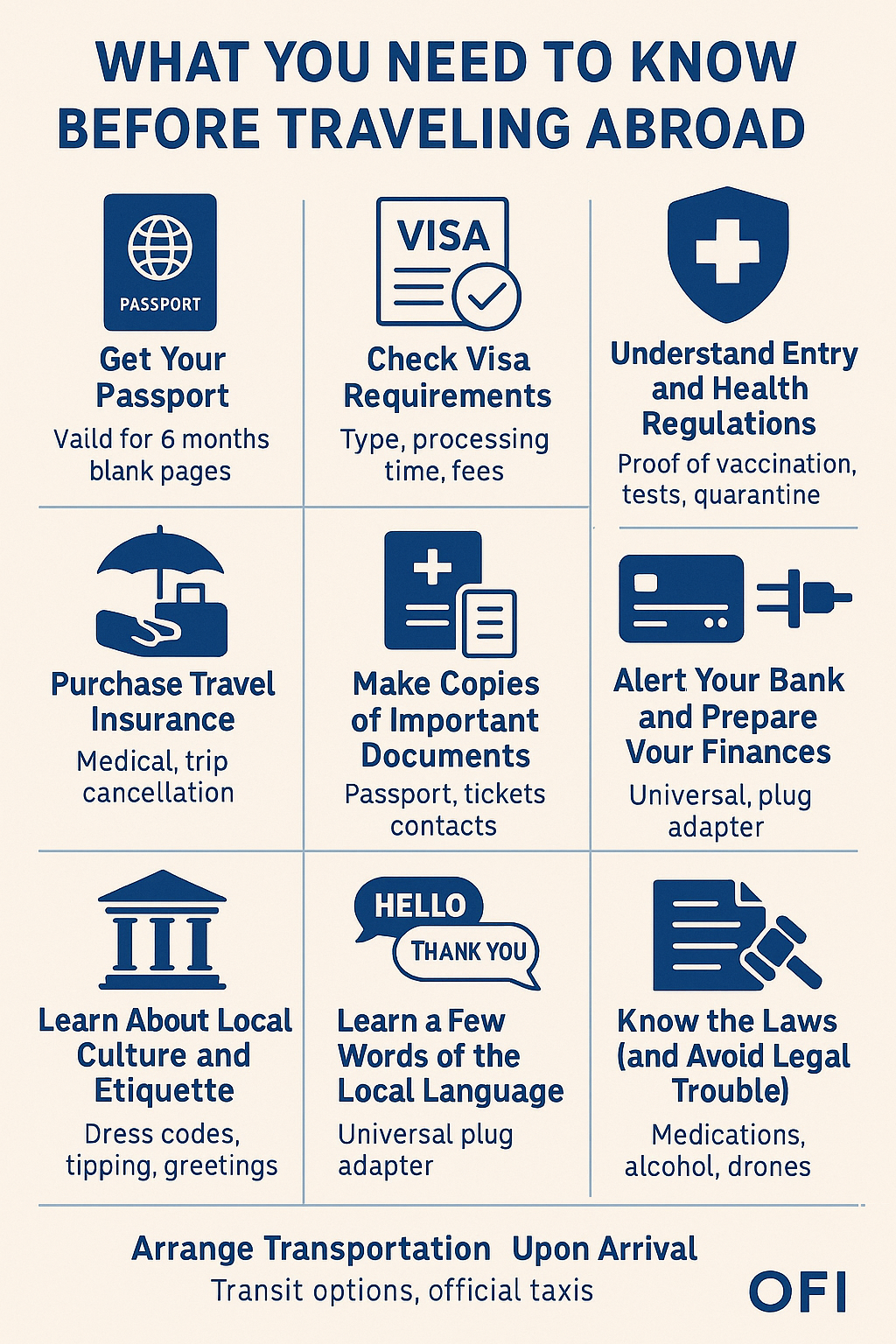Traveling abroad is an exciting and enriching experience—but it also comes with responsibilities and logistics that you may not encounter on domestic trips. From documentation to culture, being well-prepared helps ensure your international journey goes smoothly and stress-free.
Here’s everything you need to know before hopping on a plane to another country.
Get Your Passport (and Check the Expiration Date)
Your passport is your most important travel document. Many countries require:
- At least 6 months of validity beyond your planned return date
- At least two blank pages for visa stamps
If you don’t already have a passport, apply early—it can take weeks or even months depending on your country. If you have one, check the expiration date and renew it if necessary.
Check Visa Requirements
Visa policies vary depending on your nationality and destination. Check:
- If a visa is required before you arrive or if you can get one on arrival
- The type of visa you need (tourist, business, transit)
- Processing times and application fees
- Documents needed (e.g., proof of income, hotel reservations)
Always refer to the official embassy or consulate website for the most accurate information.
Understand Entry and Health Regulations
Since the COVID-19 pandemic, many countries have introduced additional entry requirements. These may include:
- Proof of vaccination
- Negative PCR or antigen test results
- Digital entry forms
- Quarantine protocols
Also check if specific vaccines (e.g., yellow fever) are mandatory depending on your destination.
Purchase Travel Insurance
Travel insurance protects you from:
- Medical emergencies
- Lost or delayed luggage
- Trip cancellations or interruptions
- Theft or damage to belongings
Choose a policy that covers international travel and is accepted in the countries you’ll visit. Medical coverage is especially important, as healthcare abroad can be expensive.
Make Copies of Important Documents
Digital and paper backups can save you in emergencies. Make copies of:
- Passport ID page
- Visa(s)
- Travel insurance
- Vaccination certificates
- Hotel reservations and flight tickets
- Emergency contacts
Store them in cloud services (like Google Drive or Dropbox) and carry printed versions in a different bag from your originals.
Alert Your Bank and Prepare Your Finances
Banks may block transactions if they detect activity in foreign countries unless you’ve notified them beforehand.
Also consider:
- Getting a travel-friendly credit/debit card with no foreign transaction fees
- Carrying a mix of local currency and USD/EUR
- Checking ATM availability and withdrawal fees at your destination
- Knowing the exchange rate to avoid being overcharged
Apps like XE or Revolut can help you manage currency exchange and track spending.
Learn About Local Culture and Etiquette
Being respectful and culturally aware makes a big difference. Research:
- Dress codes (especially in religious sites)
- Tipping practices
- Greetings and common phrases
- Do’s and don’ts (e.g., gestures that are offensive)
- Religion and traditions
A little cultural knowledge can go a long way toward better interactions and even better experiences.
Learn a Few Words of the Local Language
Even basic communication can open doors and show respect. Try learning:
- Hello, goodbye
- Thank you, please
- Excuse me
- How much does it cost?
- Where is the bathroom?
Apps like Duolingo, Google Translate, and offline dictionaries are incredibly useful when traveling internationally.
Check Electrical Outlets and Bring Adapters
Plug types and voltage vary between countries. Check:
- Plug type (e.g., Type A, C, G, I)
- Voltage compatibility for your devices
- Bring a universal adapter or travel plug set
If your electronics are not dual voltage (110–240V), you may need a converter as well.
Arrange Transportation Upon Arrival
Avoid airport confusion by planning ahead:
- Know how you’ll get from the airport to your accommodation
- Research public transport options and costs
- Download local ride-hailing apps (e.g., Uber, Grab, Bolt)
- Avoid scams by using official taxis or pre-arranged shuttles
It’s smart to have offline maps downloaded before arriving.
Know the Laws (and Avoid Legal Trouble)
Some things that are legal in your home country might be illegal elsewhere. Always be aware of:
- Drug laws (even medications!)
- Drinking laws and age limits
- Public behavior expectations (e.g., PDA, smoking)
- Drone use and photography restrictions
Respecting local laws keeps you safe and avoids serious trouble.
Be Prepared, Travel Smarter
International travel is all about exploration and discovery—but preparation is what gives you peace of mind. By doing your homework in advance and being flexible along the way, you can minimize stress, maximize safety, and focus on what matters most: enjoying the journey.
Safe travels and may your passport be filled with incredible memories.
